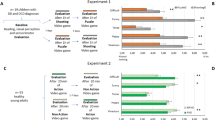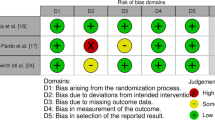Abstract
This controlled randomized single-blind study evaluated the effects of cognitive training (CT), compared to active music therapy (AMT) and neuroeducation (NE), on initiative in patients with mild to moderate Alzheimer’s disease (AD). Secondarily, we explored the effects of CT on episodic memory, mood, and social relationships. Thirty-nine AD patients were randomly assigned to CT, AMT, or NE. Each treatment lasted 3 months. Before, at the end, and 3 months after treatment, neuropsychological tests and self-rated scales assessed initiative, episodic memory, depression, anxiety, and social relationships. At the end of the CT, initiative significantly improved, whereas, at the end of AMT and NE, it was unchanged. Episodic memory showed no changes at the end of CT or AMT and a worsening after NE. The rates of the patients with clinically significant improvement of initiative were greater after CT (about 62%) than after AMT (about 8%) or NE (none). At the 3-month follow-up, initiative and episodic memory declined in all patients. Mood and social relationships improved in the three groups, with greater changes after AMT or NE. In patients with mild to moderate AD, CT can improve initiative and stabilize memory, while the non-cognitive treatments can ameliorate the psychosocial aspects. The combining of CT and non-cognitive treatments may have useful clinical implications.

Similar content being viewed by others
References
Bahar-Fuchs A, Clare L, Woods B (2013) Cognitive training and cognitive rehabilitation for mild to moderate Alzheimer’s disease and vascular dementia. Cochrane Database Syst Rev 6. doi:10.1002/14651858.CD003260.pub2
McKhann GM, Knopman DS, Chertkow H, Hyman BT, Jack CR Jr, Kawas CH, Klunk WE, Koroshetz WJ, Manly JJ, Mayeux R, Mohs RC, Morris JC, Rossor MN, Scheltens P, Carrillo MC, Thies B, Weintraub S, Phelps CH (2011) The diagnosis of dementia due to Alzheimer’s disease: recommendations from the National Institute on Aging-Alzheimer’s Association Workgroups on diagnostic guidelines for Alzheimer’s disease. Alzheimers Dement 7:263–269. doi:10.1016/j.jalz.2011.03.005
Miyake A, Friedman NP, Emerson MJ, Witzki AH, Howerter A, Wager TD (2000) The unity and diversity of executive functions and their contributions to complex “frontal lobe” tasks: a latent variable analysis. Cogn Psychol 41:49–100. doi:10.1006/cogp.1999.0734
Ueda T, Suzukamo Y, Sato M, Izumi SI (2013) Effects of music therapy on behavioral and psychological symptoms of dementia: a systematic review and meta analysis. Ageing Res Rev 12:628–641. doi:10.1016/j.arr.2013.02.003
Choi J, Twamley EW (2013) Cognitive rehabilitation therapies for Alzheimer’s disease: a review of methods to improve treatment engagement and self-efficacy. Neuropsychol Rev 23:48–62. doi:10.1007/s11065-013-9227-4
Mahncke HW, Bronstone A, Merzenich MM (2006) Brain plasticity and functional losses in the aged: scientific bases for a novel intervention. Prog Brain Res 157:81–109. doi:10.1016/S0079-6123(06)57006-2
Belleville S, Clement F, Mellah S, Gilbert B, Fontaine F, Gauthier S (2011) Training-related brain plasticity in subjects at risk of developing Alzheimer’s disease. Brain 1134:1623–1634. doi:10.1093/brain/awr037
Fernandez-Prado S, Conlon S, Mayan-Santos JM, Gandoy-Crego M (2012) The influence of a cognitive stimulation program on the quality of life perception among the elderly. Arch Gerontol Geriatr 54:181–184. doi:10.1016/j.archger.2011.03.003
Wilson BA (2002) Towards a comprehensive model of cognitive rehabilitation. Neuropsychol Rehabil 12:97–110. doi:10.1080/09602010244000020
Clare L, Linden DEJ, Woods RT, Whitaker R, Evans SJ, Parkinson CH, van Paasschen J, Nelis SM, Hoare Z, Yuen KSL, Rugg MD (2010) Goal-oriented cognitive rehabilitation for people with early-stage Alzheimer disease: a single-blind randomized controlled trial of clinical efficacy. Am J Geriatr Psychiatry 18:928–939. doi:10.1097/JGP.0b013e3181d5792a
Woods B, Aguirre E, Spector AE, Orrell M (2012) Cognitive stimulation to improve cognitive functioning in people with dementia. Cochrane Database Syst Rev 2. doi:10.1002/14651858.CD005562.pub2
Sohlberg MM, McLaughlin KA, Pavese A, Heidrich A, Posner MI (2000) Evaluation of attention process training and brain injury education in persons with acquired brain injury. J Clin Exp Neuropsychol 22:656–676. doi:10.1076/1380-3395(200010)22:5;1-9;FT656
Cicerone KD, Dahlberg C, Malec JF, Langenbahn DM, Felicetti T, Kneipp S, Ellmo W, Kalmar K, Giacino JT, Harley JP, Laatsch L, Morse PA, Catanese J (2005) Evidence-based cognitive rehabilitation: updated review of the literature from 1998 through 2002. Arch Phys Med Rehabil 86:1681–1692. doi:10.1016/j.apmr.2005.03.024
Cipriani G, Bianchetti A, Trabucchi M (2006) Outcomes of a computer-based cognitive rehabilitation program on Alzheimer’s disease patients compared with those on patients affected by mild cognitive impairment. Arch Gerontol Geriatr 43:327–335. doi:10.1016/j.archger.2005.12.003
Engelberts NH, Klein M, Adèr HJ, Heimans JJ, Trenité DG, van der Ploeg HM (2002) The effectiveness of cognitive rehabilitation for attention deficits in focal seizures: a randomized controlled study. Epilepsia 43:587–595. doi:10.1046/j.1528-1157.2002.29401.x
Hampstead BM, Gillis MM, Stringer AY (2014) Cognitive rehabilitation of memory for mild cognitive impairment: a methodological review and model for future research. J Int Neuropsychol Soc 20:135–151. doi:10.1017/S1355617713001306
Cooke M, Moyle W, Shum D, Harrison S, Murfield J (2010) A randomized controlled trial exploring the effect of music on quality of life and depression in older people with dementia. J Health Psychol 15:765–776. doi:10.1177/1359105310368188
Raglio A, Bellelli G, Traficante D, Gianotti M, Ubezio MC, Gentile S, Villani D (1994) Trabucchi M (2010) Efficacy of music therapy treatment based on cycles of sessions: a randomised controlled trial. Aging Ment Health 14:900–904. doi:10.1080/13607861003713158.Aldridge
Aldridge D (1994) Alzheimer’s disease: rhythm, timing and music as therapy. Biomed Pharmacother 48:275–281. doi:10.1016/0753-3322(94)90172-4
Raglio A, Bellelli G, Traficante D, Gianotti M, Ubezio MC, Villani D, Trabucchi M (2008) Efficacy of music therapy in the treatment of behavioral and psychiatric symptoms of dementia. Alzheimer Dis Assoc Disord 22:158–162. doi:10.1097/WAD.0b013e3181630b6f
Sung HC, Lee WL, Li TL, Watson R (2012) A group music intervention using percussion instruments with familiar music to reduce anxiety and agitation of institutionalized older adults with dementia. Int J Geriatr Psychiatry 27:621–627. doi:10.1002/gps.2761
Thaut MH, Gardiner JC, Holmberg D, Horwitz J, Kent L, Andrews G, Donelan B, McIntosh GR (2009) Neurologic music therapy improves executive function and emotional adjustment in traumatic brain injury rehabilitation. Ann N Y Acad Sci 1169:406–416. doi:10.1111/j.1749-6632.2009.04585.x
Giovagnoli AR, Oliveri S, Schifano L, Raglio A (2014) Active music therapy improves cognition and behaviour in chronic vascular encephalopathy: a case report. Complement Ther Med 22:57–62. doi:10.1016/j.ctim.2013.11.001
Novelli G, Papagno C, Capitani E, Laiacona M, Vallar G, Cappa SF (1986b) Tre test clinici di ricerca e produzione lessicale. Taratura su soggetti normali. Arch Psicol Neurol Psichiat 47:447–506
Yudofsky SC, Hales RE (eds) (2008) The American Psychiatric Publishing textbook of neuropsychiatry and behavioral neurosciences. American Psychiatric Pub, Arlington
Henry JD, Crawford JR, Phillips LH (2004) Verbal fluency performance in dementia of the Alzheimer’s type: a meta-analysis. Neuropsychologia 42:1212–1222. doi:10.1016/j.neuropsychologia.2004.02.001
Novelli G, Papagno C, Capitani E, Laiacona M, Cappa SF, Vallar G (1986) Tre test clinici di memoria verbale a lungo termine. Taratura su soggetti normali. Arch Psicol Neurol Psichiat 47:278–296
Giovagnoli AR, Erbetta A, Reati F, Bugiani O (2008) Differential neuropsychological patterns of frontal variant frontotemporal dementia and Alzheimer’s disease in a study of diagnostic concordance. Neuropsychologia 46:1495–1504. doi:10.1016/j.neuropsychologia.2007.12.023
Aresi A, Giovagnoli AR (2009) The role of neuropsychology in distinguishing the posterior cortical atrophy syndrome and Alzheimer’s disease. J Alzheimers Dis 18:65–70. doi:10.3233/JAD-2009-1123
Orsini A, Grossi D, Capitani E, Laiacona M, Papagno C, Vallar G (1987) Verbal and spatial immediate memory span: normative data from 1355 adults and 1112 children. Ital J Neurol Sci 8:539–548
Caffarra P, Vezzadini G, Dieci F, Zonato F, Venneri A (2002) Rey-Osterrieth complex figure: normative values in an Italian population sample. Neurol Sci 22:443–447. doi:10.1007/s100720200003
Giovagnoli AR, Del Pesce M, Mascheroni S, Simoncelli M, Laiacona M, Capitani E (1996) Trail making test: normative values from 287 normal adult controls. Neurol Sci 17:305–309
Spinnler H, Tognoni G (1987) Standardizzazione e taratura italiana di test neuropsicologici. Neurol Sci 6:1–120
Basso A, Capitani E, Laiacona M (1987) Raven’s coloured progressive matrices: normative data on 305 adult normal controls. Funct Neurol 2:189–194
Beck AT, Weissman A, Lester D, Trexler L (1987) The measurement of pessimism: the hopelessness scale. J Consult Clin Psychol 42:861–865
Pedrabissi L, Santinello M (1989) Inventario per l’ansia di “stato” e di “tratto”. Nuova versione italiana dello STAY. Forma Y: Manuale. Italia: Organizzazioni Speciali.
Lubben JE (1988) Assessing social networks among elderly populations. Family & Community Health 11:42–52
Norusis MJ (1998) SPSS 9.0 for Windows: Release 8.0. Chicago
Mahncke HW, Connor BB, Appelman J, Ahsanuddin ON, Hardy JL, Wood RA, Joyce NM, Boniske T, Atkins SM, Merzenich MM (2006) Memory enhancement in healthy older adults using a brain plasticity-based training program: a randomized, controlled study. Proc Natl Acad Sci 103:12523–12528. doi:10.1073/pnas.0605194103
Acknowledgements
The authors thank the patients and their families for collaborating to the study.
Author information
Authors and Affiliations
Corresponding author
Ethics declarations
Conflict of interest
The authors declare that they have no conflict of interest.
Grant support
A salary of a neuropsychologist was supported by an Italian Ministry of Health’s grant.
Rights and permissions
About this article
Cite this article
Giovagnoli, A.R., Manfredi, V., Parente, A. et al. Cognitive training in Alzheimer’s disease: a controlled randomized study. Neurol Sci 38, 1485–1493 (2017). https://doi.org/10.1007/s10072-017-3003-9
Received:
Accepted:
Published:
Issue Date:
DOI: https://doi.org/10.1007/s10072-017-3003-9




